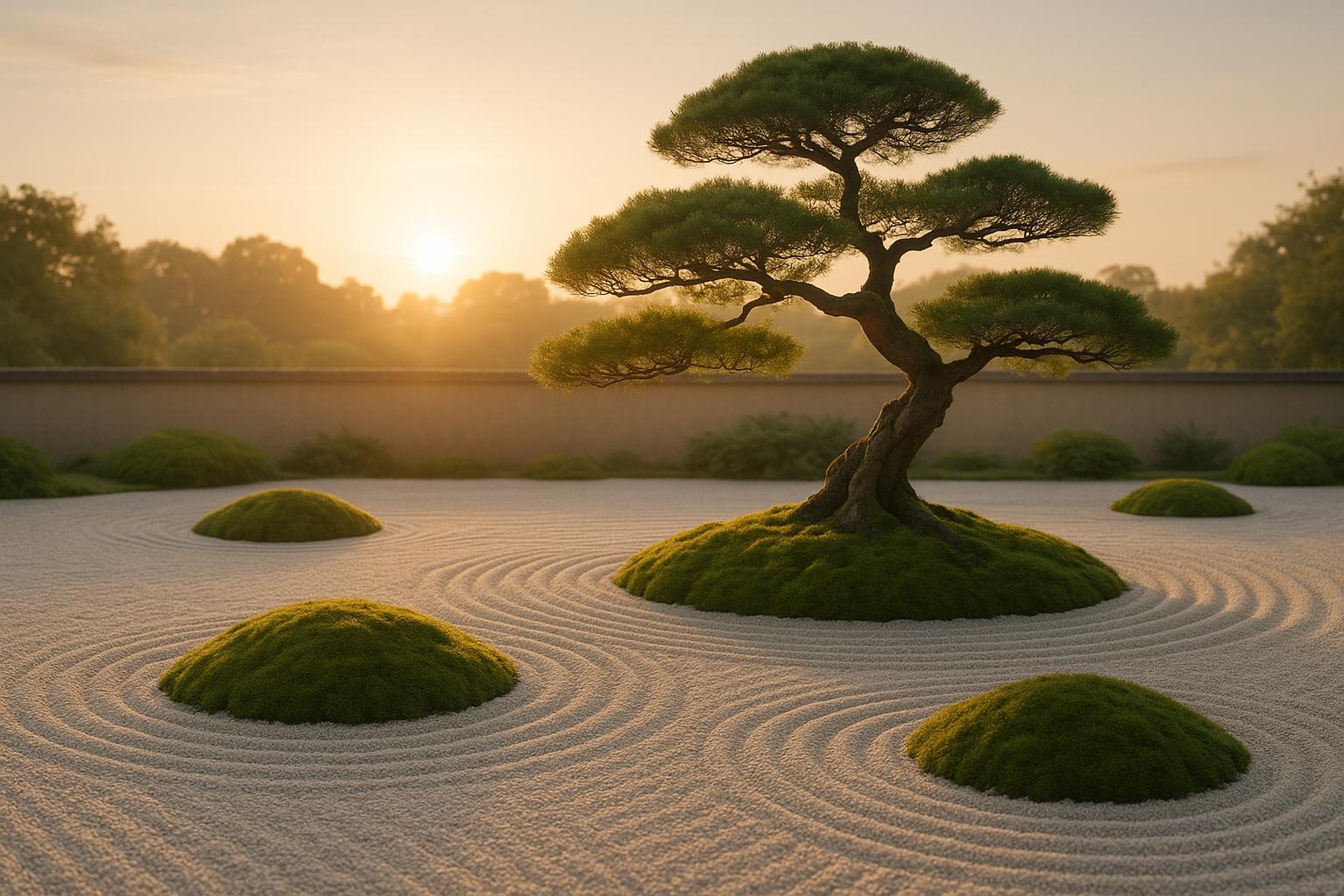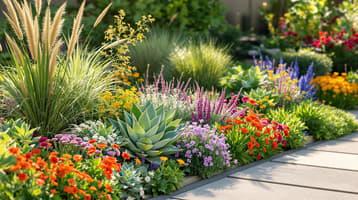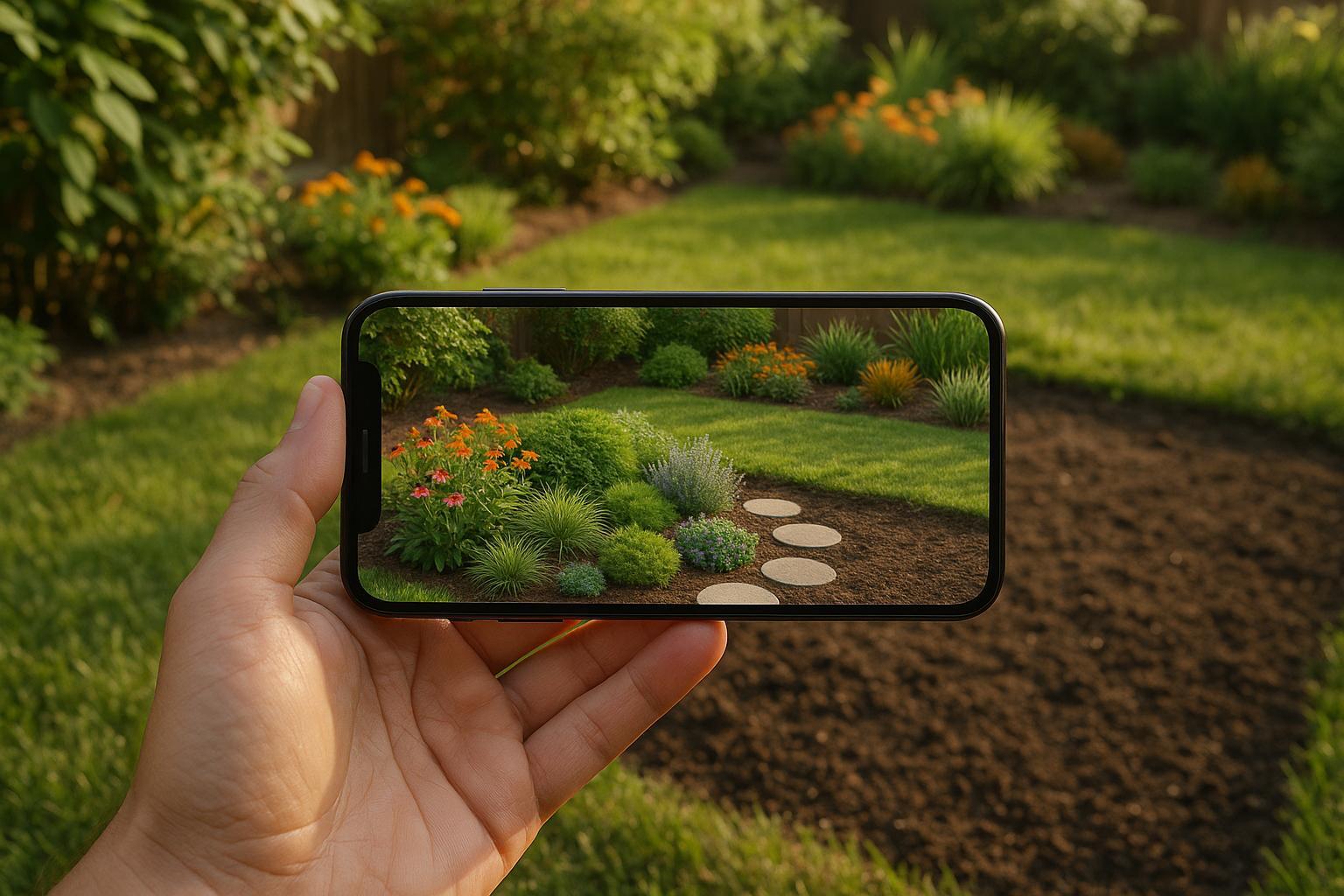Plants in Zen Gardens: Symbolic Roles

Zen gardens are serene spaces deeply connected to Japanese Buddhist philosophy, where every plant is chosen for its meaning and purpose. These gardens are designed not only for visual appeal but also to inspire meditation, mindfulness, and reflection. Plants play a vital role in conveying lessons about life, change, and resilience through their symbolism.
Key Points:
- Bamboo: Represents strength and flexibility, bending without breaking.
- Moss: Symbolizes patience and the passage of time, creating a tranquil atmosphere.
- Cherry Blossoms: Highlight life's fleeting nature and the beauty of impermanence.
- Lotus: Reflects spiritual growth, rising from muddy waters to bloom in purity.
Each plant contributes to the garden’s calming design, reflecting harmony, change, and endurance. By understanding their meanings, you can create a Zen garden that fosters peace and introspection.
Do Zen Gardens Have Plants? - Spiritual Universe Unlocked

Core Principles of Plant Symbolism in Zen Gardens
The foundation of Zen gardens is deeply rooted in Buddhist teachings that see nature as a reflection of spiritual truths. Every plant choice in these gardens is guided by principles of mindfulness and enlightenment. These values don't just influence what plants are included - they also shape how they're arranged and maintained to create a serene, reflective space.
By understanding these guiding principles, gardeners can design Zen gardens that fulfill their purpose: to inspire meditation, mindfulness, and spiritual growth. The symbolism behind these gardens isn’t random. It’s grounded in centuries of Buddhist philosophy and Japanese aesthetics, which treat plants as profound teachers of life’s lessons. Let’s delve into how these ideas take shape through themes of balance and impermanence.
Harmony and Balance
Zen gardens achieve harmony by embracing contrasts - light and shadow, rough and smooth textures - and plants play a key role in creating this balance.
Rather than relying on symmetry, Zen gardens use asymmetrical balance to reflect the organic patterns of nature. For example, a single towering pine tree might balance a group of smaller shrubs, while moss-covered rocks provide a rough counterpoint to the sleekness of bamboo. This approach mirrors the unpredictability of the natural world.
Another layer of harmony comes from seasonal balance. Zen gardens are designed to remain visually engaging throughout the year. Evergreen plants like pine and bamboo offer structure and consistency, while deciduous trees and shrubs bring seasonal changes that echo life’s natural rhythms. Together, they create a dynamic yet harmonious landscape.
Color harmony is also essential. Zen gardens favor muted, understated tones over bright, bold colors. Different shades of green dominate, creating depth and subtle interest. When flowers are included, they’re typically soft hues like white, pale pink, or gentle yellow - colors that enhance the garden’s calming atmosphere rather than distract from it.
Impermanence and Resilience
Central to Buddhist philosophy is the idea that everything is in a constant state of change. Zen garden plants are chosen to reflect this truth. Cherry blossoms are a perfect example - their brief but stunning bloom serves as a reminder to appreciate beauty in the present moment, as it is fleeting.
Deciduous trees shed their leaves, flowers bloom and fade, and even evergreens show subtle changes over time. These natural cycles encourage an acceptance of change, helping individuals cultivate peace with life’s transitions.
Resilience complements impermanence in Zen philosophy. While change is inevitable, the ability to endure and adapt is celebrated. Bamboo is a powerful symbol of this idea - it bends under the weight of storms but doesn’t break, springing back upright once the winds pass.
Moss serves as another poignant example. It grows slowly and steadily, showing persistence and resilience, while also reminding us of impermanence as it transforms the surfaces it covers. Ancient stones, softened by moss, illustrate how even the most solid things are subject to change over time.
Pine trees symbolize endurance and strength, often shaped by harsh winds and weather into unique, rugged forms that tell stories of survival. The practice of niwaki (a Japanese pruning technique) brings out the tree’s character, highlighting its resilience and inner strength.
In Zen gardens, aging is embraced. Weathered bark, twisted branches, and moss-covered surfaces are seen as signs of wisdom and experience. This acceptance of natural aging encourages us to approach our own life changes with grace and dignity. These timeless lessons ensure that every plant in a Zen garden contributes to a larger spiritual narrative.
Key Plants and Their Symbolic Meanings in Zen Gardens
In Zen gardens, every plant is chosen with purpose, carrying deep spiritual meanings that align with Buddhist teachings and philosophies. These gardens are not just about aesthetics - they're about creating a space that inspires reflection and growth. The plants act as symbols, weaving a narrative of harmony, impermanence, and mindfulness. By understanding the meaning behind each plant, you can honor the traditions that have shaped Zen gardens for centuries.
Bamboo: Strength and Adaptability
Bamboo stands tall as a symbol of resilience and adaptability. It reflects the Buddhist teaching of bending without breaking, reminding us to approach life's challenges with both strength and grace.
"In Japanese culture, bamboo symbolizes strength, flexibility, and purity." - Ramon M., HomeDesignsAI
Its slender stalks sway gently in the breeze, creating a calming rhythm that enhances the meditative atmosphere of the garden. Bamboo's ability to bend under pressure and return upright mirrors the Zen principle of resilience, offering a lesson in perseverance.
"Bamboo is unique due to its properties. It's very strong, beautiful and ages rapidly in the open air, giving a noble patina of time to a garden." - Anshin-sad
As bamboo ages, it develops a rich patina, adding a timeless quality to the garden. This natural transformation is a visual reminder of the beauty in imperfection and change, inviting us to reflect on our own ability to endure and grow.
Moss: Patience and Timelessness
Moss captures the quiet essence of Zen philosophy. It symbolizes humility, the passage of time, and the understated beauty of imperfection, often associated with the concept of wabi-sabi. Its soft, lush texture creates a serene, ancient ambiance that complements the garden's other elements.
Moss thrives slowly, teaching the virtue of patience. Over time, it softens the hard edges of stones and pathways, binding the garden's elements into a harmonious whole. This gradual growth reflects the idea that beauty unfolds over time, encouraging mindfulness and appreciation for life's slower rhythms.
Its muted green tones add depth without overwhelming the garden's simplicity, reinforcing the balance and tranquility that Zen design strives to achieve.
Cherry Blossom: Fleeting Beauty and Renewal
Cherry blossoms, or sakura, are treasured in Zen gardens for their delicate beauty and the poignant reminder of life's impermanence. They embody mono no aware, a deep awareness of the fleeting nature of all things, urging us to savor each moment.
The blossoms' brief bloom highlights the transient nature of life, while their fall symbolizes the natural cycles of renewal and rebirth. Each spring, their arrival after winter's dormancy brings hope and a sense of new beginnings, perfectly aligning with Zen's celebration of life's cyclical rhythms.
This fleeting beauty encourages reflection on impermanence, reminding us to cherish the present and find meaning in the ephemeral.
Lotus: Purity and Spiritual Growth
The lotus holds a sacred place in Asian culture, symbolizing purity, enlightenment, and spiritual awakening. In Zen gardens, it represents the triumph of the spirit over adversity, rising from murky waters to bloom in pristine elegance.
"Lotus flowers are deeply symbolic in Japanese culture, representing purity and enlightenment. Their exquisite blooms rise above the water, embodying resilience and beauty." - SavanaGarden
The lotus's journey from muddy depths to radiant bloom serves as a metaphor for spiritual transformation. It reflects the idea that beauty and enlightenment can emerge from life's challenges, reinforcing the garden's message of renewal and mindful growth.
This profound symbolism invites reflection on personal transformation and the pursuit of inner peace, making the lotus a powerful element in Zen garden design.
sbb-itb-4d6a8dd
🚀 Ready to Reinvent Your Garden?
Join thousands of homeowners who have transformed their gardens using our AI design tool. Upload one photo to explore endless possibilities.
Get your AI garden designs →Practical Tips for Adding Symbolic Plants to Modern Zen Gardens
Creating a Zen garden is about blending symbolic meaning with practicality. To achieve this, it's essential to choose plants that resonate with Zen principles while also thriving in your local environment.
Choosing Plants for Local Climates and Conditions
When designing a Zen garden, start by selecting plants that align with your region's climate and soil conditions. For example, bamboo, a classic Zen garden staple, comes in varieties suited to different climates. Clumping bamboo works well in colder regions, while running bamboo thrives in warmer areas. Be sure to check local regulations, as some bamboo species are considered invasive and may be restricted.
Moss, another Zen garden favorite, thrives in shaded, moist environments. If you live in a humid area, moss can grow naturally with minimal effort. In drier regions, you may need to provide additional moisture or opt for drought-resistant ground covers that mimic moss's appearance.
Cherry blossoms bring seasonal beauty but require careful variety selection. Some types need a cold dormancy period, while others are better suited to mild climates. Matching the right cherry blossom variety to your area's conditions ensures healthy growth and vibrant blooms.
Lotus plants, known for their spiritual significance, need consistently warm water to thrive. In colder climates, consider growing them in portable containers so they can be moved indoors during winter.
To give your plants the best chance of success, prepare soil that's well-draining and rich in organic matter. If your soil is heavy or clay-like, amend it with sand and compost or create raised beds to improve drainage. Additionally, protect delicate plants during harsh winters and prune deciduous trees during their dormant season to encourage graceful growth.
Using AIGardenPlanner for Plant Selection

For a modern twist on traditional Zen gardening, tools like AIGardenPlanner can simplify the plant selection process. This AI-powered platform analyzes your local conditions - such as climate, soil type, and weather patterns - to recommend plants that balance Zen symbolism with practical growing needs.
The tool provides detailed insights tailored to your location, factoring in rainfall, temperature changes, and seasonal shifts. If you upload a photo of your garden, the AI can assess sun exposure and drainage patterns, offering suggestions that fit your unique space.
AIGardenPlanner also includes region-specific guides for plant care, covering everything from planting schedules to watering and seasonal maintenance. For those looking to blend traditional Zen elements with modern design, the platform allows you to experiment with different styles and layouts before finalizing your plan.
With its professional-grade tools, AIGardenPlanner ensures you account for proper plant spacing and mature sizes, helping you create a serene, balanced garden that embodies the essence of Zen design.
Conclusion: The Lasting Power of Symbolic Plants in Zen Gardens
Zen gardens, steeped in centuries of tradition, use symbolic plants to create a bridge between the tangible and the spiritual. Each plant carries profound meaning - bamboo stands tall as a symbol of resilience, while moss quietly whispers lessons of humility and finding beauty in simplicity. Together, these plants transform outdoor spaces into sanctuaries of peace and reflection.
The beauty of a Zen garden lies in its harmony. Every plant is chosen with care, not just for its symbolism but also for its ability to thrive in its environment. A garden where plants grow naturally and flourish over time becomes a living testament to Zen principles. Whether it’s moss thriving in a humid corner or a lotus gracing warm, still waters, the right plants amplify the garden’s spiritual essence.
Modern tools like AIGardenPlanner make it easier to honor these traditions while addressing today’s gardening challenges. By helping select plants suited to your specific climate and soil, these tools ensure your garden remains vibrant and healthy. When symbolic plants thrive, their messages of balance, impermanence, and mindfulness resonate even more deeply.
A well-designed Zen garden offers more than physical beauty - it becomes a refuge in a fast-paced, chaotic world. With each passing season, the symbolic plants anchor us in tranquility, reminding us to slow down, reflect, and reconnect with the present moment.
FAQs
How can I use plants with symbolic meanings to design a Zen garden?
To create a Zen garden with symbolic plants, focus on species that carry meanings aligned with the emotions or principles you want to emphasize. For example, bamboo stands for strength and flexibility, while moss embodies calmness and balance. Cherry blossoms are a reminder of renewal and life's fleeting beauty, and pine trees reflect endurance and a long life.
By choosing plants with thoughtful symbolism, you not only enhance the garden's beauty but also cultivate a space that encourages reflection and serenity. Blending these elements carefully can result in a Zen garden that feels deeply personal and spiritually grounded.
How can I choose plants for a Zen garden that suit my climate while preserving their symbolic meaning?
To cultivate a serene Zen garden, select plants that not only suit your local climate but also uphold their symbolic meanings. Focus on plants native to your area or those suited to your region's conditions, as they’ll thrive with less effort. Arrange them based on their light and water requirements to create a harmonious and low-maintenance space. For instance, bamboo, symbolizing resilience, thrives in sunny locations, while moss, representing harmony, prefers shaded, moist areas. By aligning plants with their natural surroundings, you ensure their vitality while preserving the peaceful ambiance of your garden.
How does Zen philosophy's focus on impermanence shape the choice and arrangement of plants in a Zen garden?
Zen philosophy's focus on impermanence shapes the design of Zen gardens by highlighting simplicity, natural beauty, and an acceptance of life's ever-changing nature. Plants such as bamboo, which symbolizes strength and adaptability, and moss, a reflection of harmony and timelessness, are carefully selected to embody these values.
The placement of plants in a Zen garden is deliberately minimal, following the wabi-sabi aesthetic that values asymmetry and imperfection. This thoughtful design invites mindfulness and quiet reflection, offering a serene space that captures the fleeting beauty of life while promoting a sense of calm and balance.
Related posts
Related Articles

Ultimate Guide to AI-Powered Soil Monitoring
Learn how AI-powered soil monitoring transforms gardening with real-time insights for healthier soil and more efficient resource use.

Mastering the Art of Tilting Your Treasure Garden Umbrella
Learn the essential steps and tips for effectively tilting your Treasure Garden umbrella to maximize shade coverage and outdoor comfort. Explore the optimal tilt angle and maintenance advice.

AI Tools for Creating Low-Maintenance Plant Combinations
Explore AI tools that simplify garden planning by matching plants to your conditions, ensuring low-maintenance and visually appealing combinations.

How AR Previews Transform Garden Planning
Explore how Augmented Reality is revolutionizing garden planning with real-time visuals, precise measurements, and personalized plant guidance.

7 Garden Design Mistakes to Avoid When Planning Your Landscape
Avoid common garden design pitfalls with these essential tips for creating a beautiful and functional landscape year-round.

Low-Latency IoT Sensors for Pest Monitoring
Explore how IoT pest sensors provide rapid alerts, detailed data, and remote monitoring for effective pest management in your garden.